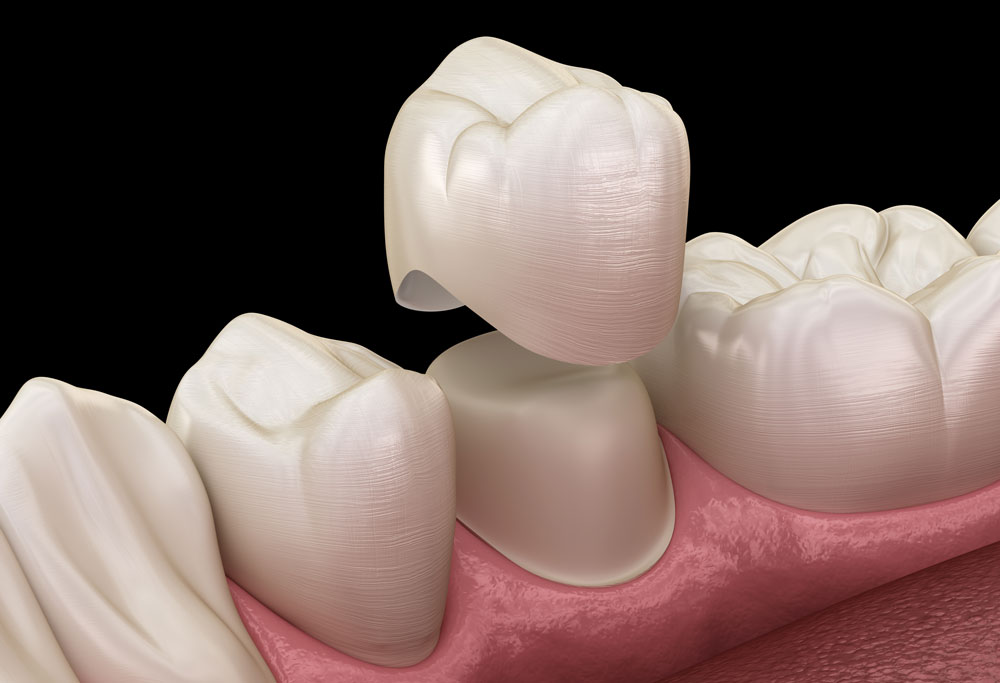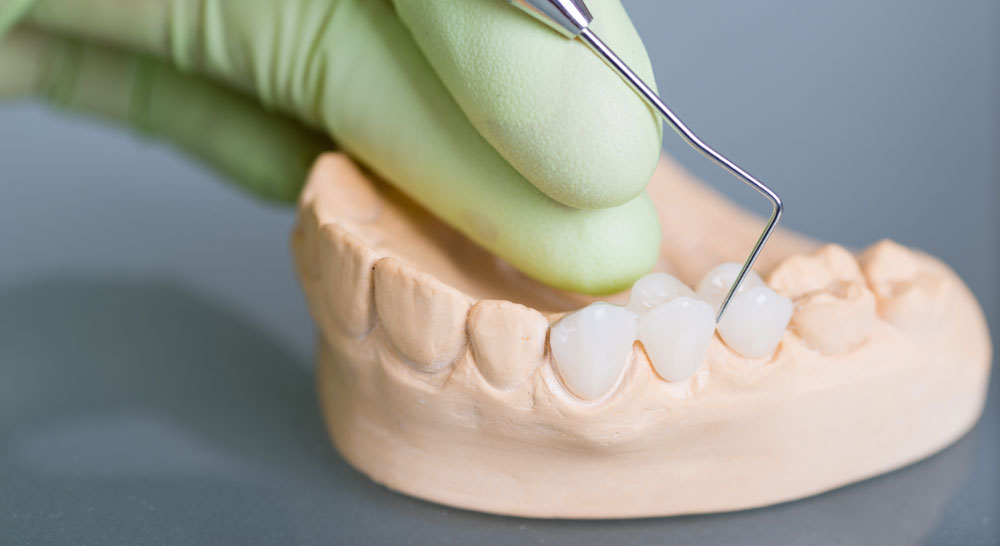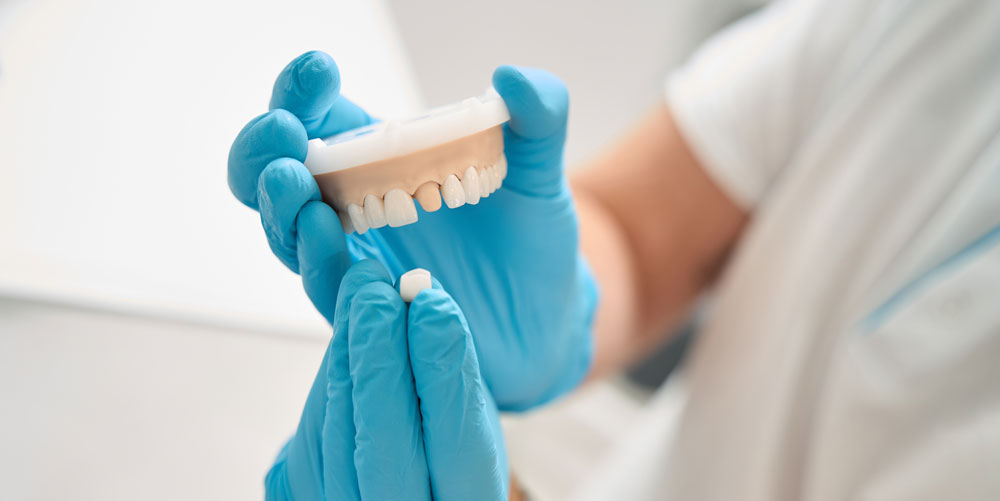Dental health is essential for overall well-being, and one of the most common dental procedures is getting dental caps, commonly known as dental crowns.
These tooth-shaped caps restore the strength, size, shape, and appearance of a tooth, particularly after damage or decay.
However, understanding the cost for dental caps and the factors that influence these prices can be a daunting task.
This post will look at different types of dental crowns, their costs, and what you can expect from dental crown treatments in the UK.

What are dental caps?
Dental caps, or dental crowns, are protective coverings that encase a damaged or weakened tooth.
The primary purpose of dental caps is to restore the strength and shape of a tooth affected by decay, damage, or a previous root canal treatment.
A tooth cap can also be used to cover dental implants, providing a natural look and feel.
Additionally, dental crowns can improve the alignment of your bite, which can reduce the risk of tooth decay and other dental issues over time.
The procedure is commonly performed by a dental professional in a dental practice or clinic.
Benefits of investing in dental caps
Investing in dental caps offers several benefits, making them a valuable addition to your dental care.
Improved functionality
Dental crowns restore the functionality of a damaged tooth, allowing for proper chewing and biting. This is especially important for molars that endure significant pressure. A well-fitted crown can help maintain your bite, reducing strain on surrounding teeth.
Aesthetic enhancements
Crowns can improve the appearance of your natural teeth, providing a beautiful smile. This is particularly beneficial for front teeth, where aesthetics are crucial. Choosing a crown material that closely matches the colour of your natural teeth can enhance your smile significantly.
Long-term savings on dental care
While the initial cost of dental crowns can be high, they can save you money in the long run by preventing further damage and the need for more extensive dental procedures. Investing in high-quality crowns can minimize the likelihood of future dental issues.
Boosting confidence
Having a healthy, attractive smile can boost your self-confidence and positively impact your social interactions. Dental crowns can help you feel more confident in your appearance, whether you’re in a professional setting or spending time with friends and family.
Prevention of further dental issues
By restoring a damaged or weakened tooth, dental crowns can help prevent further dental issues, such as decay or infection. Crowns provide a protective barrier that can shield vulnerable areas of your teeth, promoting overall dental health.

Types of dental caps
Understanding the various types of dental crowns is crucial as they have different costs, durability, and aesthetic properties.
Metal crowns
Metal crowns are made from alloys, such as gold or platinum, and are known for their durability. They are often recommended for molars that require strength, making them a popular choice for dental crowns on the back teeth.
Crowns made of metal can withstand heavy chewing forces without breaking or chipping, making them an ideal choice for long-term dental solutions.
Gold crowns
Gold crowns are a subtype of metal crowns, providing a long-lasting solution for damaged teeth. They withstand significant chewing forces and rarely chip or break, but their high cost can be a drawback for some patients.
They are also less likely to cause wear to adjacent teeth, which is an important consideration for patients with natural teeth.
Porcelain crowns
Porcelain dental crowns offer a natural tooth appearance and can be used on both front and back teeth. However, they may not be as durable as metal crowns and can be more susceptible to chipping.
They are often chosen for aesthetic reasons, particularly for visible teeth, as they can be closely matched to the colour of natural tooth enamel.
Zirconia crowns
Zirconia crowns combine strength and aesthetics. They are biocompatible and can be used in both anterior and posterior areas, making them a versatile option for many patients.
Zirconia is more durable than porcelain, and because it can be made to match the colour of natural teeth, it is a popular choice for those seeking both strength and aesthetics.
Composite resin crowns
Composite resin crowns provide a more affordable alternative but may not last as long as other materials. They are typically used for temporary crowns or cosmetic purposes on front teeth.
While they can be easily shaped and coloured to match the surrounding teeth, they may require more frequent replacements than their metal or porcelain counterparts.
Stainless steel crowns
Stainless steel crowns are often used for children or as temporary crowns for adults. They are cost-effective and durable but less aesthetically pleasing.
Due to their strength, these metal dental crowns are particularly ideal for molars and can be left in place until the tooth beneath it has fully developed.
Porcelain fused to metal crowns
Porcelain fused to metal crowns combines the strength of metal with the aesthetic appeal of porcelain. They are commonly used but may show a metal line at the gum line over time.
This type of dental crown offers a good balance between durability and appearance, making it a popular choice among dentists and patients.
All porcelain crowns
All porcelain crowns are purely aesthetic and are used mainly for visible teeth. While they provide a natural appearance, they are less durable compared to metal crowns and may not be suitable for patients with a history of teeth grinding or heavy chewing forces.
Your dentist will be able to advise you on what the right dental crown material for you is going to be, depending on what it is you are looking for.

Factors affecting the cost of dental caps
Several factors can influence the cost of dental crowns, making it essential to understand each component before undergoing treatment.
Material choice
The dental crown material chosen significantly affects the price. Metal crowns, especially gold, along with porcelain and ceramic crowns, are among the most expensive, while composite resin and stainless steel crowns tend to be more affordable.
The choice of material will depend on individual needs, such as aesthetics, location in the mouth, and personal budget.
Geographic location
Costs can vary depending on your geographic location. Urban areas with higher living costs typically have higher dental crown costs than rural locations.
Additionally, different dental clinics may have varying pricing structures based on their overhead costs and the demand for services in the area.
Dentist’s experience and reputation
The expertise and reputation of the dental professional can also impact the dental crowns cost. Experienced dentists with a good reputation may charge more for their services, but their quality of work can justify the expense.
It’s essential to find a dentist who not only offers reasonable pricing but also has a track record of successful crown placements.
Lab fees
Lab fees for creating custom crowns can also vary. High-quality dental labs that use advanced technology and materials will typically charge more, influencing the overall cost of dental crown procedures.
When consulting with your dentist, inquire about the lab they use and their reputation in the industry.
Complexity of the case
The complexity of your dental situation can also affect the cost of crowns.
For example, if you require additional treatments, such as a root canal, before the crown placement, this will add to the overall cost. Patients with broken teeth or extensive decay may need more complex treatment plans, resulting in higher costs.
On the other hand, if you only need a single tooth crown, you will find that this is significantly less expensive.
Insurance coverage
Many dental insurance plans provide partial coverage for dental crowns, especially when they are deemed medically necessary. However, coverage can vary widely, so it’s essential to review your policy and discuss it with your dental clinic.
Initial consultation costs
Before undergoing a dental crown treatment, an initial consultation is necessary. This step often incurs costs, which should be factored into your budget.
Exam and diagnosis
During the first visit, your dentist will conduct a comprehensive exam and diagnosis, assessing the condition of your natural teeth and determining if a dental crown is necessary. This evaluation typically costs between £50 to £100, depending on the dental practice.
Imaging and X-rays
Imaging, such as X-rays, may be required to assess the tooth’s condition. The cost for X-rays can range from £10 to £150, depending on the type and number required. Digital X-rays, while more expensive, provide clearer images and often expose patients to lower levels of radiation.
Treatment plan development
After the exam, your dentist will develop a treatment plan. While this may not have a direct cost, it’s essential to understand what procedures will be necessary and their associated costs.
This step often includes discussing the types of dental crowns available and helping you choose the right crown material.
The procedure for getting a dental cap
The dental crown procedure involves several steps that contribute to the overall cost. Understanding these stages can help you prepare for the process.
The first step in the dental crown procedure involves preparing the tooth. The dentist will numb the area and remove any decay or damage. This step is crucial for ensuring a proper fit for the crown.
Depending on the extent of the damage, additional procedures, such as a root canal treatment, may be necessary before the crown can be placed.
Once the tooth is prepared, the dentist will take impressions of your mouth to create a custom crown. This step ensures that the crown fits comfortably and aligns correctly with your bite.
Modern technology often allows for digital impressions, which can streamline the process and improve accuracy.
A temporary crown will be placed to protect the prepared tooth while waiting for the permanent crown. Temporary crowns are generally less expensive but are not designed for long-term use.
They are often made from acrylic or stainless steel and are intended to be a short-term solution until the permanent crown is ready.
When the permanent crown is ready, your dentist will fit it over the prepared tooth, ensuring it is comfortable and aligned.
The final placement is a critical step in ensuring the longevity and effectiveness of the crown. Your dentist will check your bite and make any necessary adjustments to guarantee a proper fit.

Insurance coverage and financing options
Understanding your dental insurance coverage is crucial when considering the costs associated with dental crowns. Many plans cover a portion of the treatment, while others may have specific limitations.
Common insurance policies for dental caps
Most dental insurance policies cover a portion of the cost of dental crowns, particularly when deemed necessary due to tooth decay or damage.
It’s essential to check your policy for specific details. Some plans may only cover specific types of crowns, such as metal crowns, while excluding others.
Payment plans offered by dentists
Many dental clinics offer payment plans to help patients manage the costs of treatments. This can be a valuable option if you are concerned about the upfront costs associated with dental crowns.
Discussing these options with your dentist can help you find a plan that fits your budget.
Medicred
Medicred offers tailored finance solutions specifically for dental treatments, including crowns, in the UK. This allows you to split your dental crown costs into manageable monthly payments.
With competitive interest rates and flexible repayment terms, Medicred can help you access the dental care you need without the burden of high upfront costs. It may even be that you can apply for financing directly through your dental clinic, making the process as straightforward as possible.
This option can be particularly beneficial for those without comprehensive dental insurance or those needing extensive treatment, ensuring that finances do not become a barrier to maintaining good oral health.
Average cost ranges for dental caps
Understanding the average cost ranges for dental crowns can help you budget effectively for your dental treatment.
In the UK, the average cost of dental crowns can range from £300 to £1,500, depending on the material used and the complexity of the case. For patients without insurance, understanding this range is critical for financial planning.
Dental crown cost breakdown by material:
- Metal Crowns: £500 – £1,500
- Gold Crowns: £800 – £2,500
- Porcelain Crowns: £300 – £1,000
- Zirconia Crowns: £600 – £1,400
- Composite Resin Crowns: £200 – £600
- Stainless Steel Crowns: £100 – £400
Regional differences can significantly affect the cost of dental crowns. For example, dental clinics in London may charge more compared to those in smaller towns. This variation can also be influenced by the demand for dental services in specific areas.
Additional costs to consider
When budgeting for dental crowns, it’s essential to consider any additional costs that may arise.
After the crown is placed, follow-up visits may be required to ensure proper fit and function. These visits can incur additional costs, typically ranging from £50 to £100. Regular check-ups are essential to maintain your oral health and ensure your crown remains in good condition.
Possible complications and replacements
In some cases, complications may arise, requiring additional treatments or even replacement of the crown. Understanding these potential costs can help you plan for the future. If a crown becomes loose or damaged, prompt attention from a dentist can prevent further complications.
Oral hygiene products for care
Proper care of your dental crowns is crucial for their longevity. You may need to invest in specific oral hygiene products, such as special toothpaste or brushes, to maintain your oral health. Discuss with your dentist the best care routine for your crowns.
Lifestyle changes for longevity
Certain lifestyle changes can help extend the life of your crowns. For instance, avoiding hard foods or reducing teeth grinding through protective nightguards can prevent damage to both crowns and natural teeth.

Find the right long-lasting dental crown solution for you
While the dental crown costs may seem high, the long-term benefits to your dental health and overall well-being are invaluable. Investing in quality dental care now can lead to a healthier and more confident smile in the future.
Remember that the value of dental crowns extends beyond aesthetics; they play a critical role in maintaining your oral health and functionality.
Frequently asked questions
What is the average lifespan of a dental crown?
Most dental crowns last between 10 to 15 years, but with proper care and maintenance, some can last even longer.
Can dental crowns be whitened?
Dental crowns cannot be whitened like natural teeth. If you’re considering teeth whitening, it’s advisable to do so before getting crowns.
What happens if a dental crown becomes loose?
If a crown feels loose, you should contact your dentist immediately. They can assess the situation and determine if the crown can be re-cemented or if a replacement is necessary.
Are dental crowns covered by insurance?
Many dental insurance plans provide partial coverage for dental crowns, especially when deemed medically necessary. Check with your insurance provider for specific details.
Can I get a dental crown if I have gum disease?
It’s essential to treat any existing gum disease before placing a crown. Your dentist will evaluate your gum health before proceeding with crown treatment.